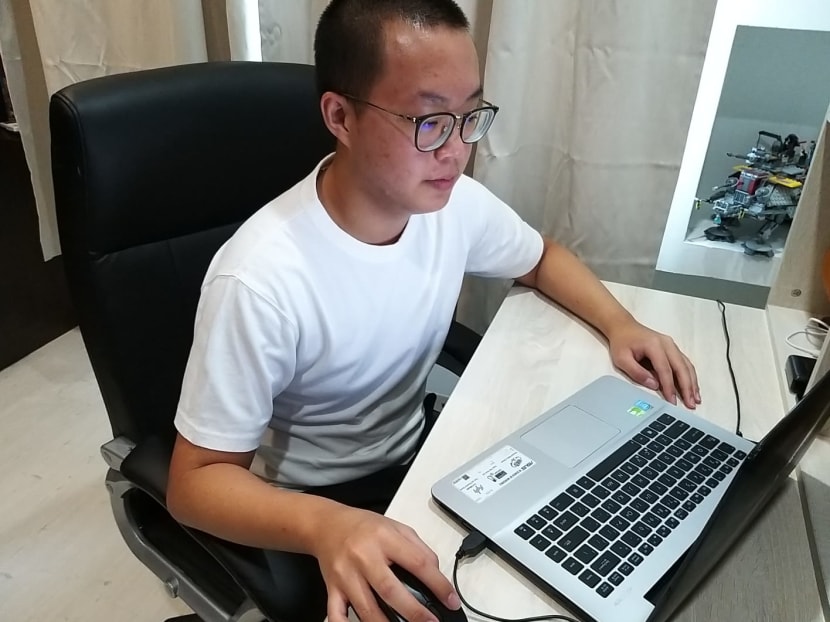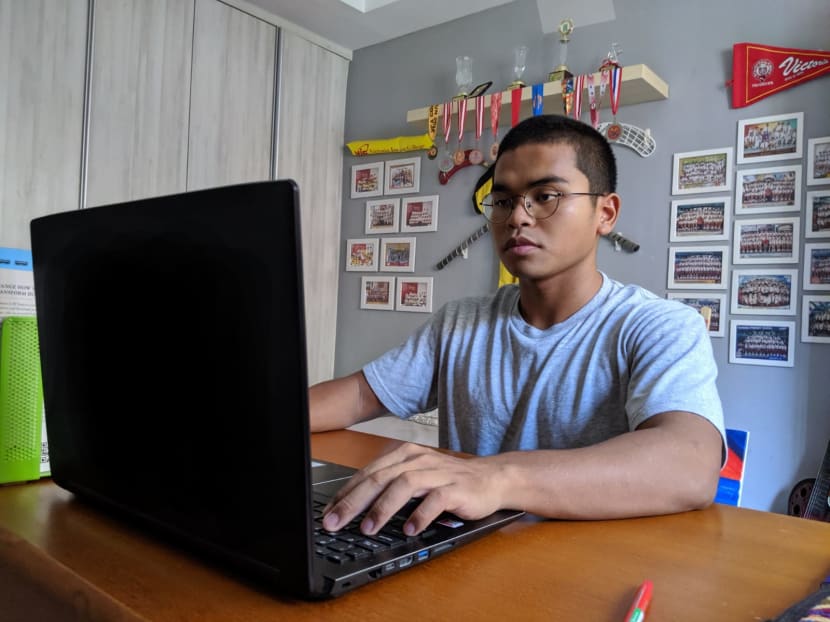BMT recruits learning, staying fit at home amid circuit breaker measures
SINGAPORE — Singapore Armed Forces (SAF) recruit Ferguson Chiew wakes up every day at 6am to the sound of his alarm — but what happens next will not be familiar to any Singaporean male who has done Basic Military Training (BMT) over the years.

Recruit Ferguson Chiew, 18, doing home-based learning for his Basic Military Training at his home in Tampines.
SINGAPORE — Singapore Armed Forces (SAF) recruit Ferguson Chiew wakes up every day at 6am to the sound of his alarm — but what happens next will not be familiar to any Singaporean male who has done Basic Military Training (BMT) over the years.
Instead of falling in with the rest of Eagle Company as he did for the first week of his BMT, Recruit Chiew, 18, reports his temperature on the SAF temperature-taking web application while still at his home in Punggol.
Then the former Meridian Junior College student goes back to sleep until physical training at 8am. He picked up the exercises he uses, such as the warm-up and cooldown, from his home-based learning (HBL) module as well as circuit training videos put up on the Defence Ministry’s (Mindef) Facebook page.
This has been his routine for the past two weeks as one of 2,600 recruits undergoing BMT, which is typically run out of the BMT Centre (BMTC) on Pulau Tekong.
This cohort has been doing HBL since circuit breaker measures were rolled out to curb the spread of Covid-19 on April 7. SAF's BMT programme will be suspended until June 1 in tandem with the extension of the nationwide circuit breaker.
Recruit Chiew said: “All these options allow us to try more exercises during our self-initiated PT (physical training) sessions."
In the afternoon, he submits his temperature again, before continuing with the HBL via SAF’s Learnet portal, which allows SAF personnel to access training content online.
At the end of these lessons, which take about three hours and 20 minutes in total to complete each day, tests are done to help recruits recapitulate what they have learnt.
Recruit Chiew said that HBL has helped to reinforce certain information, such as army dress instructions and the different foot drills that he learnt during his first conventional week of BMT. They are also still trained on the technical aspects of how to handle rifles and hand grenades through the online lectures.

Recruit Emir Ilyas Elham, 18, started earlier for his Physical Training Phase with Bronco Company, so he had already been through 10 weeks of BMT before the recruits went on HBL.
Recruit Chiew’s modules have focused more on regimentation, discipline and physical fitness, while Recruit Emir’s coursework focuses more on basic soldiering skills, such as weapon handling and first-aid lessons.
“I guess that having the HBL at home is just like doing the theory part of it in the comfort of your own home. And eventually, when you return to camp, you still carry out the practical lessons, so we are not at a loss,” said Recruit Emir, who lives in Bedok.
The former Raffles Institution student added that he and his fellow recruits are determined not to lose the progress that they had made in their initial Physical Training Phase.
After all, the 164cm-tall recruit has managed to bring his weight down by 10kg, from 78 to 68kg, and he knows of friends who have also lost significant amounts of weight.
In the meantime, he has set himself the goal of improving his performance at the Individual Physical Proficiency Test (IPPT) from silver to gold, while also losing another 4 to 5kg of weight.
To achieve those goals, he has set himself a training regimen, aside from the HBL modules that he completes throughout the day.
In the morning, he starts the day by taking his temperature at 6.30am. Then he does half an hour of stretching before breakfast.
He proceeds to complete his company’s usual routine of push-ups, sit-ups and squats before each meal as part of “mealtime PT”.
Finally, he goes for a run in the evening when there are fewer people out on the streets.
“I think that it is a good habit to bring home,” he said. “It is also something that can help me keep fit and practise for IPPT, so I try to inculcate that in my daily habits.”
Despite the circuit breaker measures, both recruits continue to stay in touch with their peers and commanders from BMT over WhatsApp.
“Over the past 10 weeks, a lot of us really bonded and forged a lot of close friendships. We are now quite close as friends and we keep in contact every day, so I guess I do miss them and I miss the experience, being in BMT,” Recruit Emir said.
During this period, the recruits’ commanders have also continued to monitor their progress with their HBL, while also guiding them through online quizzes and discussions.
Recruit Chiew said: “The physical interaction part is missing, but we are still connected as a section and platoon to help each other out.”
Following the announcement on April 21 that the circuit breaker would be extended till June 1, Mindef said that BMTC would review its curriculum to ensure that recruits are trained progressively when they return to BMT.
This includes catering for refresher sessions, known in the military as “just-in-time” sessions, as well as a review of training plans to ensure that recruits undergo a structured heat acclimatisation regime with appropriate work-rest cycles to condition them to the training tempo.









